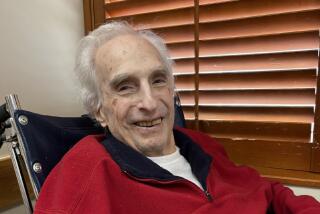Music Executive’s Debts Dwarfed Dreams
- Share via
Barry Joel Skolnick was only 30 when he died. On the surface, he appeared to be successful, president of a Hollywood recording company known for its contributions to a myriad of radio and television commercials and a few movies.
But the circumstances behind Skolnick’s death--he was shot once in the head in January, in a parking garage on Sunset Boulevard--are as mysterious as the details of his life.
The portrait that emerges is of an ambitious young man who wanted to make it big but whose soaring debt dwarfed his dreams. In reality, Skolnick ended up as a Hollywood murder victim who left behind a widow, two small boys and a history of bankruptcy.
And now his case is being investigated in the context of two other shootings linked to a Huntington Beach financial firm that allegedly used violence as a method of collecting unpaid bills. Police say a Fountain Valley woman was the victim of mistaken identity; the other victim was a San Clemente man who owed money to the firm.
Los Angeles police investigators confirmed they are looking at Premium Commercial in connection with the slaying of Skolnick, who, like the San Clemente man, was shot in a parking garage shortly before 8 in the morning, with no one else around--and with the same creditor hassling him for money.
Skolnick owed Premium Commercial Services Corp. more than $900,000 and had listed the company as sole beneficiary on a life insurance policy that paid the firm $2.5 million, sources close to the investigation said Thursday.
Much of the detail of Skolnick’s life can be found in records in U.S. Bankruptcy Court. Much of the sadness is there as well, for they reveal that Skolnick’s boys are still at the ages of 3 and 20 months, with a father they’ll never really know.
“By age 27,” reads a document filed by one creditor, “Skolnick managed to accumulate debts of [more than] $2.1 million against assets worth no more than $579,000. It appears these debts were accumulated by misrepresentations of net worth, income and authority.”
Skolnick filed for bankruptcy in September 1994. The bulk of his debt appeared to be personal guarantees given to lenders, such as $450,000 owed to Siemens Credit Corp. A man named Fred Jones had filed a claim for $400,000. It was Jones who sold Skolnick the company that became his own.
The deal cut with Jones symbolized Skolnick’s ambition--it marked his chance to run a Hollywood company--but it also hurled him into debt. In late 1991, Skolnick and other investors had formed a limited partnership to buy Fred Jones Recording Studios. Skolnick made a down payment, and, in addition, agreed to pay Jones the $400,000, according to bankruptcy records.
Skolnick worked as a Hollywood bookkeeper for Fred Jones Recordings from 1988 to 1990 and bought out Jones in 1990, renaming the business Hollywood Recording Services.
Still in business at the same Sunset Boulevard address, the company is known primarily for producing radio and television commercials, sources in the recording industry said Thursday. Its portfolio also includes a handful of movie credits.
A year after buying the recording firm, Skolnick purchased a one-third stake in JBL Sound Studios Inc. in New York, using loans from Premium Commercial, according to bankruptcy records.
Excluded from bankruptcy protection, however, was a guarantee on the $900,000 loan from Premium Commercial. Instead, the company took over Skolnick’s Hollywood Recording Services and, according to records, remains the owner.
One of the creditors in Skolnick’s bankruptcy, North Fork Bank of New York, vigorously fought for the $500,000 it was owed by Skolnick and shortly before Skolnick’s death sued Premium Commercial for the debt.
North Fork alleges that Skolnick wrongly converted collateral pledged to it by delivering company accounts receivable to Premium Commercial to satisfy Skolnick’s personal $900,000 debt. The bank is seeking the return of about $600,000, the amount of its loss.
Bankruptcy records show Skolnick’s income fluctuated: from $64,000 in 1993 to $50,000 in 1994.
At least three of Skolnick’s cars worth a total of more than $108,000 were repossessed in early 1994. Bankruptcy records showed he owed $23,426 to Porsche Credit Corp.; $38,000 to BMW Financial; and $47,000 to VW Credit.
Times staff writer Michael G. Wagner and correspondents Andrew D. Blechman and Jeff Kass contributed to this report.
More to Read
Sign up for Essential California
The most important California stories and recommendations in your inbox every morning.
You may occasionally receive promotional content from the Los Angeles Times.













